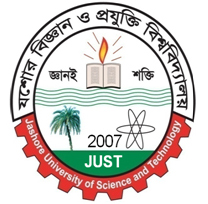
Dr. Ovinu Kibria Islam
PhD
Associate Professor
Dept. of Microbiology
Jashore University of Science and Technology

Dr. Ovinu Kibria Islam
PhD
Associate Professor
Microbiology
Jashore University of Science and Technology
Biography
Short Biography
Early Life and Education
Dr. Ovinu Kibria Islam was born on September 30, 1986, in Bangladesh. From an early age, he exhibited a keen interest in science, particularly in microbiology and biomedical research. His academic journey began at Motijheel Model High School & College in Dhaka, where he completed his Secondary School Certificate (SSC) in 2002, He continued his higher secondary education at Notre Dame College, Dhaka, graduating in 2004.
Driven by his passion for microbiology, Dr. Islam pursued a B.Sc. (Honours) in Microbiology at the University of Dhaka. His academic excellence continued into his M.S. in Microbiology (2010) at the same institution.
Dr. Islam’s commitment to advanced research led him to pursue a PhD in Microbiology, which he completed in 2021 through a joint program between the University of Dhaka, Bangladesh, and Rhine-Waal University, Germany. His doctoral research focused on the molecular basis of biofilm formation in clinical bacterial isolates, where he developed novel insights into biofilm-associated antimicrobial resistance mechanisms. This research has contributed significantly to the understanding of how biofilms enhance bacterial persistence in infections and promote resistance to antibiotics.
Academic and Professional Career
Dr. Islam’s academic career began as a Lecturer at the Department of Microbiology, Jashore University of Science and Technology (JUST), in July 2011. Over the years, he rose through the ranks, serving as an Assistant Professor (2014-2022) before being promoted to Associate Professor in April 2022.
Throughout his tenure, he has played a pivotal role in shaping microbiology education at JUST. He has designed and taught courses on microbial genomics, molecular microbiology, microbial metabolism, bioinformatics applications, and infection pathogenesis. He has also mentored undergraduate and postgraduate students, supervising over 15 M.S. theses on microbiology, genomics, and bioinformatics.
Beyond teaching, Dr. Islam has held administrative leadership roles, including serving as the Chairman of the Department of Physiotherapy and Rehabilitation (2022-2023), where he oversaw the development of the department’s academic programs and research initiatives. Additionally, in 2024, he took on the role of Director of Student Counseling and Guidance, focusing on providing students with mental health support, career guidance, and academic mentoring.
Research Focus and Scientific Contributions
Dr. Islam’s research primarily revolves around antimicrobial resistance (AMR), biofilm formation, SARS-CoV-2 genomics, microbiome studies, and infection control. His contributions to the scientific community have been instrumental in several key areas:
- Biofilm Formation and Antimicrobial Resistance (AMR)
- His research has explored biofilm formation in multidrug-resistant bacteria, including Pseudomonas aeruginosa, Acinetobacter baumannii, and Escherichia coli, highlighting their role in enhancing antimicrobial resistance and persistence in infections.
- He has also analyzed AMR transmission in environmental settings, particularly in hospital wastewater and integrated poultry-fish farming systems.
- SARS-CoV-2 Genomics and Variant Surveillance
- Dr. Islam has led genomic surveillance studies on SARS-CoV-2 variants, identifying key mutations and tracking their evolution.
- He contributed to the development of a multiplex ARMS-PCR method for the efficient detection of SARS-CoV-2 clades.
- His studies have examined co-infections with Dengue virus and their impact on viral dynamics.
- Microbiome and Host-Microbe Interactions
- His work on the COVID-19 microbiome has provided insights into microbial interactions in patients with Type 2 diabetes.
- He has also investigated bovine mastitis microbiomes, focusing on AMR transmission in livestock.
- Probiotic Research and Clinical Applications
- Dr. Islam has studied the therapeutic potential of probiotics, particularly Pediococcus acidilactici, in biofilm inhibition and gastrointestinal and metabolic disorders.
- Clinical Microbiology and Infection Control
- His research on biofilm-related infections has highlighted the role of device-related biofilms in hospital-acquired infections.
- He has also examined AMR transmission via healthcare workers’ mobile phones, emphasizing the importance of infection control measures.
- Environmental Health and Public Safety
- Dr. Islam has investigated biofilm formation in food processing environments, assessing its impact on public health and AMR control.
Research Grants and Funding
Dr. Islam has received multiple research grants to support his work, including funding from the University Grants Commission of Bangladesh and Jashore University of Science and Technology. Some of his notable projects include:
- Unraveling Molecular Mechanisms of Pseudomonas aeruginosa Biofilm Phenotypes (2023–24)
- Profiling Multidrug Resistant Bacteria in the Food Chain of Integrated Poultry and Fish Farming (2022–23)
- Impact of Biofilm-Related Genes on the Transmission of Multidrug-Resistant Pseudomonas aeruginosa in Hospitals (2022–23)
- Characterization of Antibiotic-Resistant Streptococcus pneumoniae in Children (2017–18)
- Molecular Characterization of Plant Growth-Promoting Bacteria for Sustainable Biofertilizer Development (2016–17)
Publications and Scientific Recognition
Dr. Islam has an extensive list of peer-reviewed publications in leading international journals, covering topics such as AMR, biofilm formation, SARS-CoV-2 genomics, and environmental microbiology (https://just.edu.bd/t/ovinu/publications). Some of his key publications include:
- "Genomic Variability Correlates with Biofilm Phenotypes in Multidrug-Resistant Clinical Isolates of Pseudomonas aeruginosa" (Scientific Reports, 2023)
- "Emergence of European and North American Mutant Variants of SARS-CoV-2 in South-East Asia" (Transboundary and Emerging Diseases, 2021)
- "Microbial Diversity and Functional Attributes of Yogurts in Bangladesh" (Discover Food, 2025)
- "Alternative Genome Sequencing Approaches of SARS-CoV-2 Using Ion AmpliSeq Technology" (MethodsX, 2024)
Awards and Recognitions
Dr. Islam’s contributions have been widely recognized. His achievements include:
- DAAD Scholarship (2014–2015) – Supported his PhD research in Germany.
- Dean’s Award – For outstanding academic performance during his B.Sc. (Honours) at the University of Dhaka.
Conference Contributions and Science Communication
Dr. Islam has actively participated in international conferences, presenting his research on AMR, SARS-CoV-2 genomics, and microbial resistance in hospital environments. He has also contributed as an editorial reviewer for scientific proceedings and has written science articles for Bangladeshi magazines and newspapers.
Personal Life and Interests
Beyond his academic and research pursuits, Dr. Islam is passionate about science communication and mentoring young scientists. He has served as the General Secretary of the Notre Dame Science Club and contributes to Bangladeshi science magazines such as Adri.
Last Update: 31 Jan, 2026
Research Interest
- Biofilm
- Molecular Biology
- Bioinformatics
- Molecular Virology
- Antibiotic resistance

